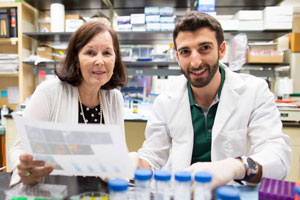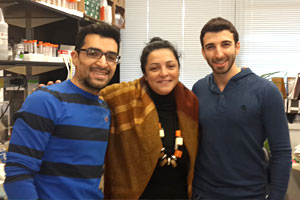

NCI Award Winner
Einstein Ph.D. Student Wins New NCI Grant
Samer Hanna, a Ph.D. candidate in the department of anatomy and structural biology, has been awarded the National Cancer Institute (NCI) Predoctoral to Postdoctoral Fellow Transition fellowship (F99/K00), a new kind of grant offered to encourage and retain outstanding graduate students who have demonstrated potential and interest in careers as independent cancer researchers. The aim of the fellowship is to ease recipients’ transition to successful cancer research postdoctoral appointments. The $220,000 grant will provide funding for the remainder of Samer’s Ph.D. thesis research and four years of his postdoctoral work.

Samer Hanna with his research mentor Dr. Dianne CoxSamer was one of only 30 students nationwide to be awarded the fellowship, and each institution was permitted just one applicant.
“Since there were several eligible students, we asked each eligible student and mentor to submit a pre-application first,” said Dr. Victoria Freedman, Einstein’s associate dean for graduate programs in the biomedical sciences.
An Exceptional Opportunity
Samer learned about the fellowship from an e-mail sent by Dr. Freedman and the graduate office. “I immediately thought the grant represented a wonderful opportunity for me as it’s directed towards upper-level graduate students (third or fourth year) and is one of very few opportunities available to non-U.S. citizens,” he said. “But most importantly, it will provide a strong foundation for independent cancer research.”
A native of Lebanon, Samer is a fifth-year Ph.D. student in the lab of Dr. Dianne Cox, professor of anatomy and structural biology and of developmental and molecular biology. His postgraduate work centers on breast cancer, furthering studies of the mechanisms through which cancer cells become invasive and metastatic (spread to other organs) that he began for his Master’s degree in molecular biology at the Lebanese American University in Beirut. He currently studies the interaction between breast cancer cells and a type of immune cell called macrophages, and its impact on tumor cell invasion and metastasis.
Dr. Cox also encouraged Samer to apply for the grant. “I advise every student to apply for their own funding, because it’s an important step in their training and will benefit their career,” she said. “The NCI F99/K00 grant was ideal for Samer since his scientific goals have always focused on cancer research.”
Good Things Do Come to Those Who Wait
During the internal selection process in January, applications from Einstein students—each including a CV, a publication record and specific aims for a research proposal—were evaluated by a faculty selection committee. Samer was notified in February that he was nominated to apply for the fellowship.
Later, while visiting home in Lebanon during summer, Samer learned that his application to the NCI had scored in the highest bracket and that he’d been selected for consideration. “I was so excited that I couldn’t sleep,” he said. After returning to the United States in August, he got confirmation that he had received a grant.
Einstein’s Relativity

Samer with Dr. El-Sibai, an Einstein alumna and his Master’s mentor in Beirut, and Bassem Khalil, another Einstein student who studied in her labSamer’s journey to Dr. Cox’s lab is testament to the spirit of collegiality that characterizes the College of Medicine. His Master’s degree mentor in Lebanon, Dr. Mirvat El-Sibai, is an Einstein alumna from the class of 2007. She earned her Ph.D. in the lab of Dr. Jonathan Backer, professor and chair of molecular pharmacology, professor of biochemistry and the William S. Lasdon Chair in Pharmacology.
During her time at Einstein, Dr. El-Sibai collaborated with Dr. Cox, who also was a member of her dissertation committee. She returned to Lebanon and became an associate professor in the department of natural science at the Lebanese American University. When Samer completed his Master’s research in her lab, she referred him to Dr. Cox, since his M.S. research in breast cancer fit well with Dr. Cox’s research.
“I’ve always wanted my students to have the same opportunities I had,” Dr. El-Sibai said. “This is why in the past I have recommended several of my most qualified and promising students to Einstein and particularly to the labs of Dr. Backer, my Ph.D. mentor who shaped the scientist and the person I am today, and of Dr. Cox, whom I strongly admire as a brilliant scientist and extremely caring person.”
Dr. Cox observed, “When Samer and I first connected, his CV was very good for his career stage. During our Skype interview, I was impressed by his thoughtfulness about the larger concepts of his project and how his results fit into the ‘big picture.’” (Unlike most Ph.D. candidates, Samer was accepted directly into a lab; most students declare a lab after working in several during their first year.)
Dr. Cox added, “Samer is a talented scientist with an established publication record and a focus on cancer research. He is inquisitive and hard-working. His research proposal also was quite novel.”
Future Plans
After earning his Ph.D., Samer plans to pursue postdoctoral training in solid tumors in live animal models, and then progress into more clinically relevant translational research using patient samples. His long-term goal is to investigate the mechanisms of cancer progression and metastasis in people as an independent researcher at an academic institution.
Posted on: Thursday, January 5, 2017


